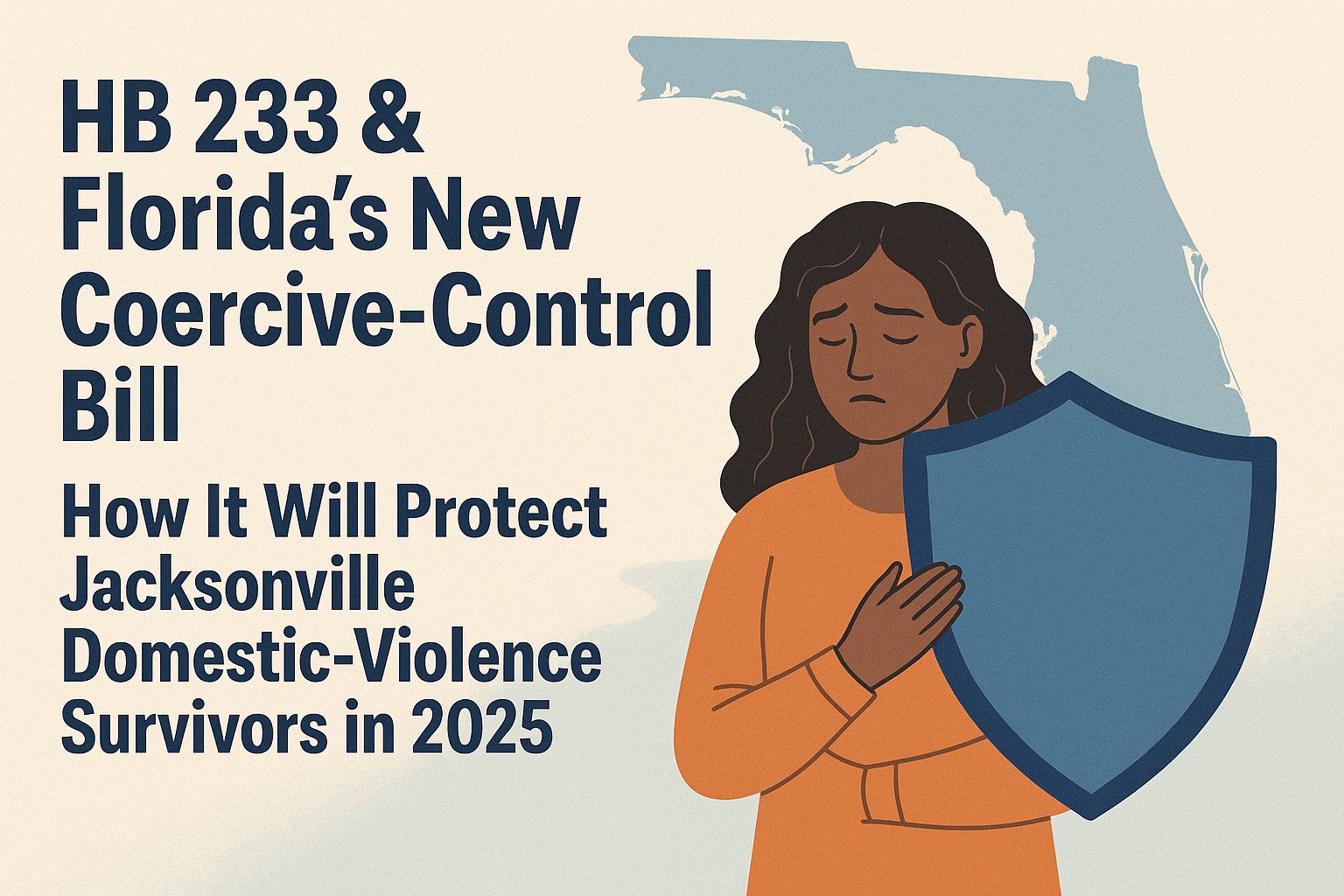HB 233 & Florida’s New Coercive-Control Bill: How It Will Protect Jacksonville Domestic-Violence Survivors in 2025
This post explains Florida's new HB 233, which recognizes coercive control as a form of domestic violence. It details how this landmark bill will provide a new legal shield for survivors in Jacksonville in 2025.

For domestic violence survivors in Jacksonville, the legal path to safety has often been limited to cases involving physical violence. This is set to change in a significant way. With the introduction of a new bill, HB 233, Florida is poised to recognize "coercive control" as a form of domestic violence. This landmark legislation will provide a new legal shield for survivors, empowering them to seek protection based on a pattern of non-physical abuse and harassment.
The New Law Explained: What is Coercive Control? 🛡️
Coercive control is a pattern of behavior that an abuser uses to dominate and control a victim. It is a systematic campaign of isolation, intimidation, and manipulation that can be just as damaging as physical violence. Under the proposed HB 233, this can include behaviors such as:
-
Financial Control: Preventing a person from accessing money, getting a job, or controlling all household finances.
-
Isolation: Cutting a person off from family, friends, and social support.
-
Monitoring and Surveillance: Tracking a person's location, phone, or online activity.
-
Micromanagement: Dictating daily activities, clothing, or even what a person eats.
By including these behaviors in the legal definition of domestic violence, HB 233 addresses the reality that abuse is a systematic campaign of control, not just a single physical act.
How HB 233 Works in Jacksonville
For domestic violence survivors in Jacksonville, HB 233 is a game-changer. It will provide a new legal basis for obtaining an injunction for protection against domestic violence. Previously, a survivor who was not physically harmed might have struggled to prove their case. Now, they can present evidence of coercive control to a judge.
This means a survivor can document and use proof of non-physical abuse—such as text messages showing constant monitoring, bank statements revealing financial manipulation, or witness accounts of isolation—to seek a legal injunction. This injunction can protect them from further contact, require the abuser to move out of a shared home, and set up temporary child custody and support arrangements.
The law will also help legal professionals and the courts better understand the complex dynamics of abuse. It empowers advocates in Jacksonville to build stronger cases and provides judges with the legal framework to issue protections based on patterns of non-physical abuse.
Taking Action: How to Utilize HB 233
If you are a survivor in Jacksonville, understanding this law is a crucial first step toward safety. Here's what you can do:
- Document Everything: Keep a record of all controlling behaviors, including dates, times, and a description of the events. Save text messages, emails, and any other relevant evidence.
- Contact a Domestic Violence Legal Resource: In Jacksonville, organizations like the Hubbard House and other local legal aid services can help you navigate this new law. They can provide free legal aid and guidance on how to file for an injunction based on coercive control.
- Prioritize Your Safety: If you are in immediate danger, please call 911 or a domestic violence hotline. The law is a tool for protection, but your physical safety comes first.
HB 233 is a significant step forward for survivor justice in Florida. It acknowledges the full spectrum of abuse and provides survivors in Jacksonville with a powerful legal compass to guide them toward a safer future.
Frequently Asked Questions (FAQs)
1. What kinds of behaviors are now legally considered abuse under HB 233?
Under the new bill, behaviors such as financial control, social isolation, constant surveillance, and psychological intimidation, when part of a pattern, are now legally considered a form of domestic violence.
2. Do I need physical evidence to use this new law?
No. This law is specifically designed for cases where physical evidence may be absent. A case can be built on a pattern of digital evidence, witness statements, and documentation of a survivor's experience.
3. How does this change the process for an injunction?
This new law broadens the legal definition of domestic violence to include coercive control. This means a survivor can now use evidence of non-physical abuse to petition for an injunction for protection.
4. Will this new law help me if the abuse happened before 2025?
While the law is set to go into effect in 2025, a pattern of abuse that began before this date can still be used as evidence to support a case for an injunction.
5. Where can I get help to use this new law in Jacksonville?
You can get free help from local legal aid organizations and domestic violence support centers like the Hubbard House. They can provide legal advice, help with paperwork, and offer emotional support.
6. Will this change how law enforcement responds to my call?
Yes. The new law will require training for law enforcement on identifying and documenting coercive control, which will lead to a more informed and effective response to your call.
